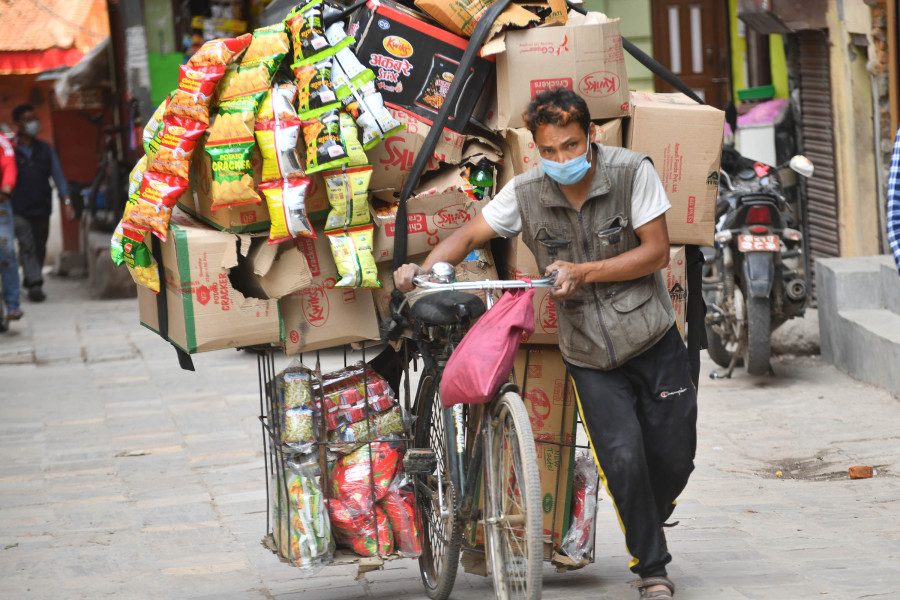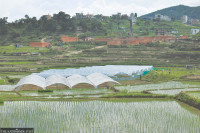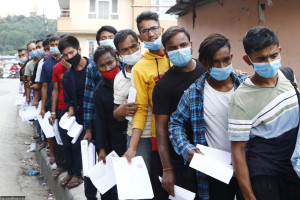Money
Rights activists find rapid response team ineffective
The job of squad representing several ministries is to keep the supply lines clear during the prohibitory period aimed to containing rising Covid-19 cases.
Krishana Prasain
The high-level rapid response team created by the Ministry of Industry, Commerce and Supplies to ensure smooth supply of essentials during the lockdown has not been as effective as it should be, say consumer rights activists.
Comprised of officials from the related ministries, the squad is tasked to facilitate transportation and supply of food items and daily consumable goods. Its job is to keep the supply lines clear during the two-week-long prohibitory period so that valley residents do not face problems.
But Madhav Timalsina, president of the Consumer Rights Investigation Forum, said that the local administration and police personnel do not seem to be coordinating with the rapid response team as traders have been stopped at different places.
“The rapid response team has been formed as a formality only as it does not seem to be facilitating supply of daily goods,” he said.
Timalsina said that traders were being stopped by the police and asked to show invoices while returning after making deliveries. “This will ultimately affect supply management,” he said.
Traders complain that trucks carrying food items have to wait in a long line at the entry points to the Kathmandu Valley, and they have to face hassles while returning after unloading their cargo.
Consumers have their own complaints. "Prices of rice, oil and sugar have soared since the government announced the stay-home order. A bag of rice which used to cost Rs1,475 now costs Rs1,600," Timalsina said.
The Federation of Nepalese Chambers of Commerce and Industry, the Confederation of Nepalese Industry and the Department of Commerce, Supplies and Industry were to jointly issue a white paper announcing the amount of food in stock to assure the people so that they would not hoard groceries, Timalsina added.
"The government should have informed the public that there are sufficient stocks of goods, and not to engage in panic buying; but it did not happen. Crowds have been gathering at the grocery stores since the government issued the prohibitory order, and people have stored goods enough for three months. This shows that the people do not have faith in the government,” Timalsina said.
"Fixing short opening hours for grocery stores is unscientific, and there is no logic in it. This only creates greater chances of infection as the shops are crowded with people who have to finish their shopping within the limited time. Grocery, vegetable, fruit, and livestock shops need to be open for 12 hours," he said.
"As people have to rush with their shopping, they do not have time to check the labels on the packages, which creates chances of their getting cheated. Traders could pass off goods that are past their expiration dates or have been relabelled," he added.
The rapid response team, which includes the joint secretaries of the Ministry of Agriculture and Livestock Development and the Ministry of Home Affairs, will coordinate and facilitate the supply system, said Prem Lal Shrestha, joint secretary at the Industry Ministry. “There is no problem regarding transportation of essential goods,” Shrestha said.
Shree Ram Ghimire, joint secretary at the Ministry of Agriculture and Livestock Development, said that travel passes were not required for the transportation of farm and livestock products.
"The truck carrying the shipment should display a sign clearly mentioning its destination, and there should not be more than two people in the vehicle, otherwise it will be stopped by the police," he said.
There will be no problems in the transportation of essential goods like during last year’s lockdown, and that is why the pass system has been removed, Ghimire said.
Farm and dairy products will not go to waste for lack of transportation like last year as no passes are required for transporting agricultural and livestock products, he said. "If there is any problem with regard to supply and transportation, they can contact the officials of the rapid response team directly."
According to Narayan Prasad Duwadi, joint secretary at the Industry Ministry, factories producing essential consumable goods and companies handling their transportation and distribution are allowed to operate freely.
"During a meeting with the heads and representatives of the umbrella organisations of industry and trade, we requested them to obey the prohibitory order to break the chain of infection, and they have agreed," Duwadi said. Government-owned enterprises have sufficient stocks of food items, he said.
Cells have been formed at the Department of Industry and the Department of Commerce, Supply and Consumer Protection to address supply and transportation problems. If there are any policy-level matters, they will liaise with the rapid response time which will coordinate with the related officials.
“Observing last year’s experience, we have requested the traders for healthy market practices,” he said. The Department of Commerce has been conducting market inspection on a regular basis, and in the current situation, we have made a provision to inspect the market at certain times so that artificial shortages and price hikes do not occur.
"The job of the rapid response team is also said to be to control black marketing, but traders are selling low quality and expired food items including masks and sanitisers," Timalsina said.




 22.95°C Kathmandu
22.95°C Kathmandu














